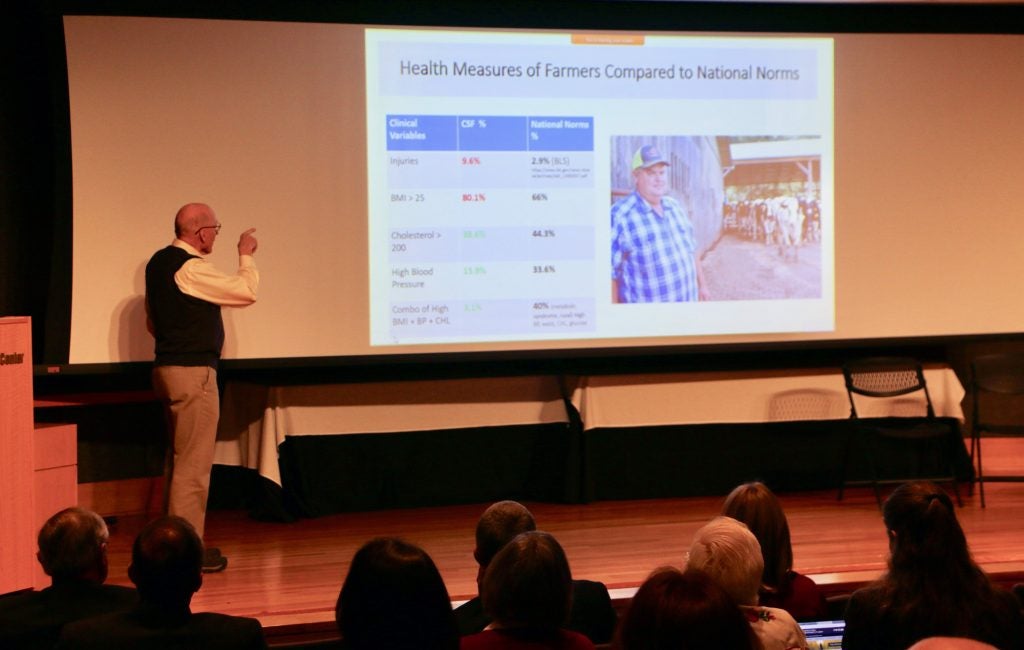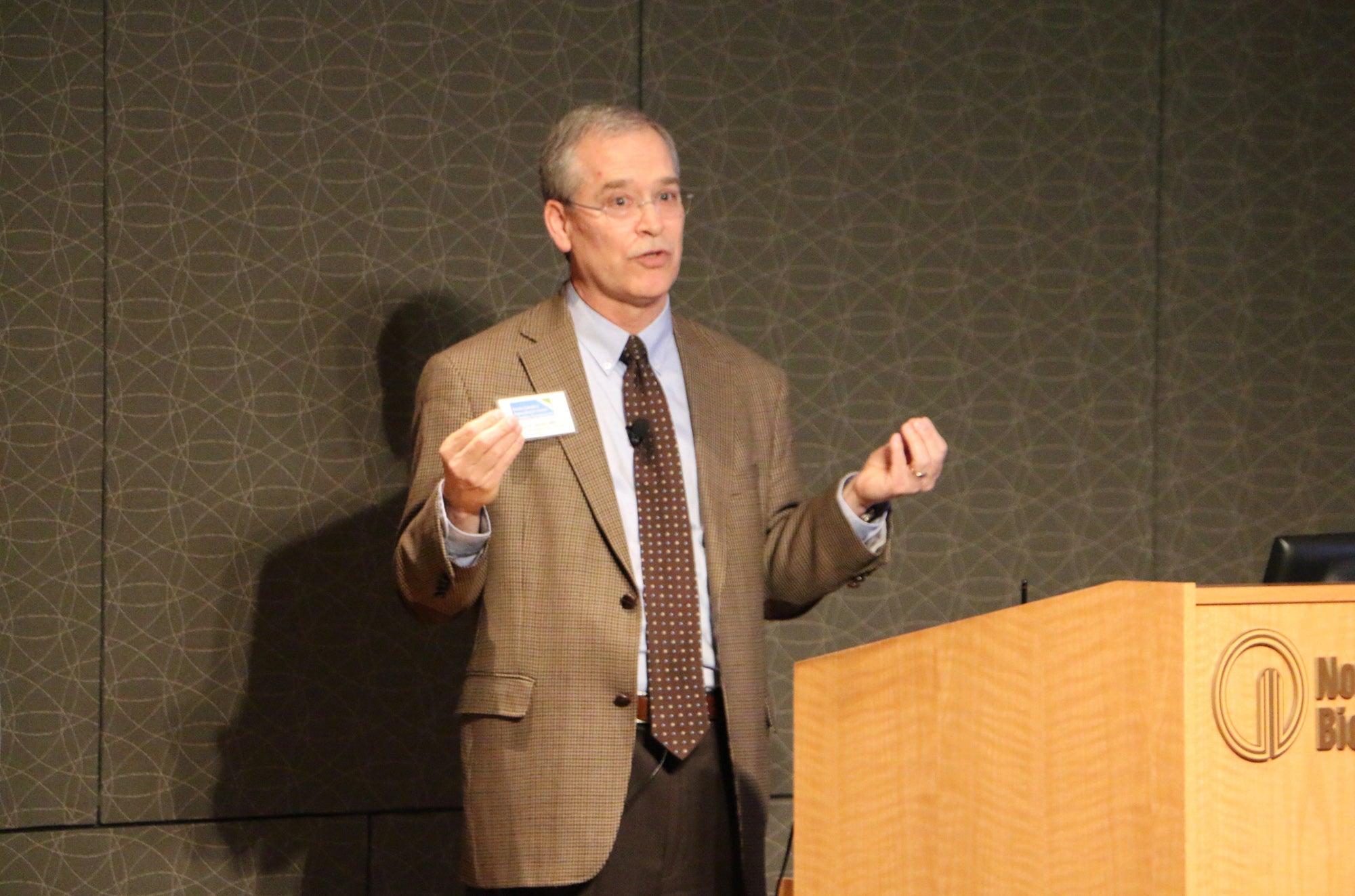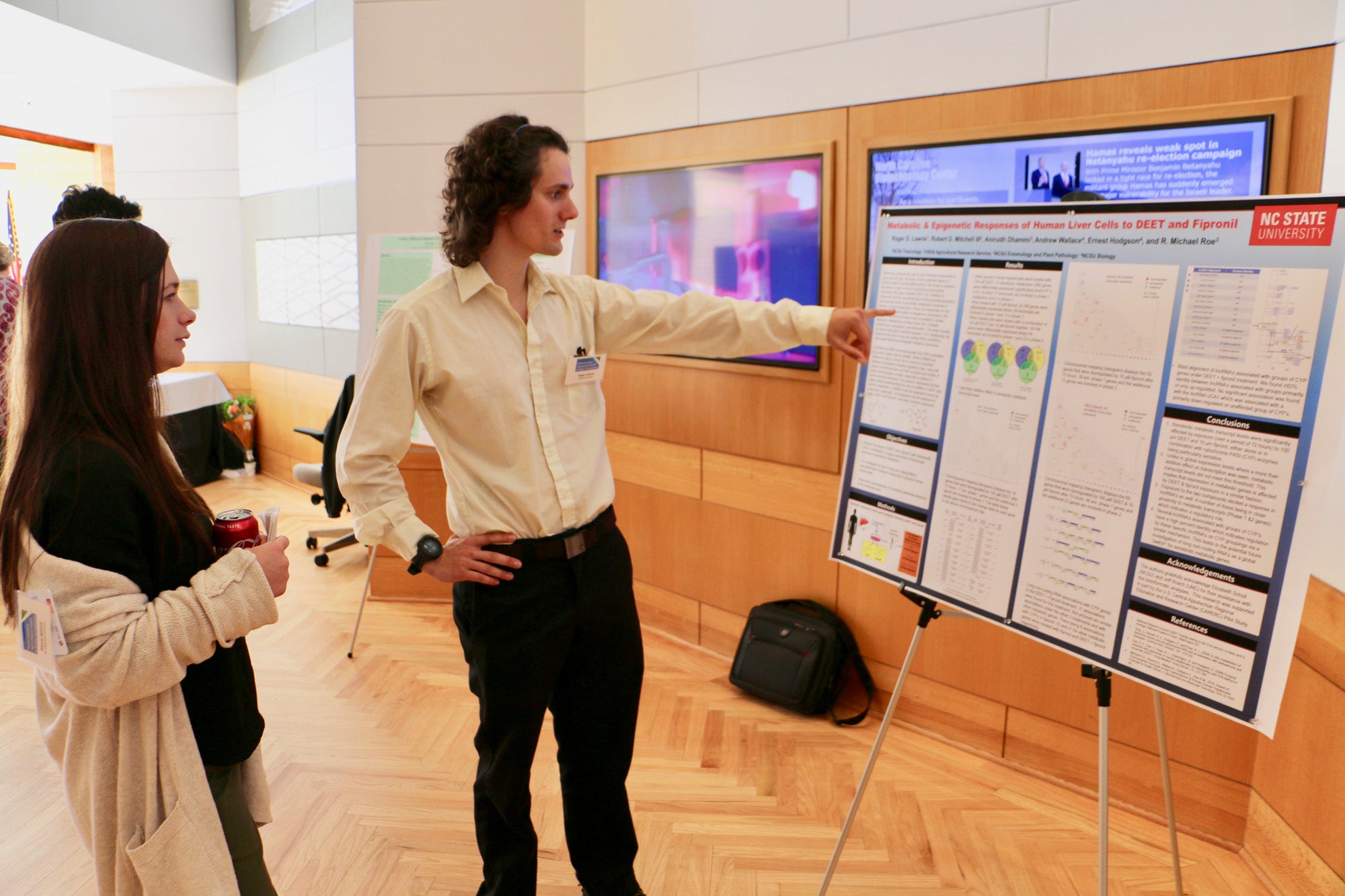Agricultural health, safety issues addressed during collaborative N.C. symposium
Agromedicine experts from around the country descended on the Research Triangle on March 27 to discuss issues facing agricultural industry workers and their families.
The 2019 North Carolina Agricultural Health and Safety Symposium – hosted by the North Carolina Agromedicine Institute (NCAI) at the N.C. Biotechnology Center in Durham – featured discussions on topics ranging from overviews of agricultural medicine and food safety to zoonotic diseases and health issues of farmers, farm workers, fishermen and their families.
The agromedicine institute is a partnership between East Carolina University, North Carolina State University and North Carolina Agricultural and Technical State University, as well as a host of collaborative partners from the agricultural community, businesses, health care organizations, governmental agencies and other universities.

Dr. Kelley Donham, professor emeritus the University of Iowa’s College of Public Health, discusses if improved wellness can reduce farm injuries during the 2019 North Carolina Agricultural Health and Safety Symposium in Durham, N.C. (Photos by Rob Spahr)
“Our mission is to promote the health and safety of farmers, fishermen, foresters, their workers and their families through research, prevention, intervention, education and outreach,” said Dr. Robin Tutor-Marcom, director of the agromedicine institute. “This event really showcased our mission and the importance of the collaboration in addressing the health and safety needs of our agricultural population.”
Shawn Harding operated a farm in Chocowinity for three decades. The Beaufort County farm began as a traditional tobacco and grain farm, then transitioned to strawberries, small fruits and vegetables in 2004.
The symposium addressed issues important to farmers statewide, Harding said.
“Farmers have a very stressful life. There is a higher incidence of accidents and problems on the farm, so it’s a special type of message that has to get out to our farmers and how they can take care of themselves and their families better,” said Harding, who is currently the public policy director for the North Carolina Farm Bureau Federation.
“We’re working outside and working with equipment, so the environment we’re working in is dangerous,” he added. “Then there’s also a lot of stress and you’re dealing with weather that’s unpredictable. All of these factors sometimes lead to us not going as slow as we need to and not being as safe, which leads to accidents and injuries.”
While the agromedicine institute largely addresses issues facing agricultural workers in North Carolina, Dr. Paul James – one of the symposium’s presenters and chair of the Department of Family Medicine at the University of Washington in Seattle – said there are issues that extend far beyond the Tar Heel State.

Dr. Paul James, chair of the Department of Family Medicine at the University of Washington in Seattle, speaks about managing the differences in agricultural and medical sciences during the 2019 North Carolina Agricultural Health and Safety Symposium in Durham, N.C.
“One of the sayings is, ‘Once you see one rural community, you’ve only seen one rural community.’ Yet, the problems of rural communities are the same,” James said. “There are issues of insurance and access to health care, issues of economic development and poverty. These are common to every rural community.”
James said he flew across the country to take part in the symposium to help celebrate the agromedicine institute, which was celebrating its 20th anniversary in conjunction with the event.
While a faculty physician in family medicine at ECU’s medical school from 1987 to 1992, James worked with other faculty from ECU and North Carolina State University to found the agromedicine program that grew into the institute.
The kind of partnership and cooperation that has helped the institute thrive and serve more than 10,000 people annually will be equally important during the next 20 years, James said, because the issues facing the nation’s agricultural workers and rural communities are as glaring as ever.
“If we are going to solve the really hard problems of today, it’s not likely that you’re going to find one silver bullet. You’re going to have to roll up your sleeves and work with people that maybe you don’t even agree with,” he said. “But it’s for the greater good of helping you communities and for helping those in communities who are at the greatest risk of having bad health outcomes.”
Dr. Byron Burlingham is another former ECU faculty member credited with laying the groundwork for the agromedicine institute. In 1977, Burlingham was one of the founding faculty members of ECU’s medical school.
“Being invited to join the development of the Brody School of Medicine was the greatest achievement of my life,” Burlingham said. “Imagine to be able to improve the health of an entire population because you came and contributed to the development of physicians and medical care in that area.”

Researchers presented their work during poster presentations at the 2019 North Carolina Agricultural Health and Safety Symposium.
The health picture in eastern North Carolina in 1977 was comparable to a Third World country, Burlingham said.
“There has been a night-and-day change in the care and life conditions of the people of eastern North Carolina since the medical school developed its program of training medical student and residents,” he said.
Due to a growing chasm between the rural and urban communities, however, Burlingham said the agricultural sector has not experienced the same kind of improvement.
“There are special problems for people who live in rural areas and have rural-based occupations. You have to be part of a rural family to realize that occupation is a family event,” said Burlingham, who retired to Kansas but felt it was important to be on hand for the symposium. “Part of it is passion. Like almost everyone here, I am from an agricultural background and we realize what the problem is. We need to do something about improving the quality of care for future generations.”
For more information about the North Carolina Agromedicine Institute’s programs and events click here.
-by Rob Spahr, University Communications